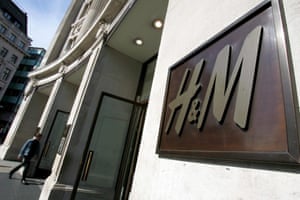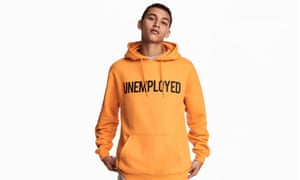
The old adage “It’s hip to be square” needs updating. These days, it’s glam to be poor.Recently, a T-shirt emblazoned with the phrase “Working Class” appeared on the website Own The Look and social media wasn’t happy. As one Twitter user put it; “Working-class people are constantly made to feel ashamed of our background and then you get sh*t like this …” The T-shirt was produced by Compania Fantastica, which told the Guardian they were sorry for causing offence: “There was no ‘aim’ [with the product] other than it was just one piece from a collection inspiration called ‘downtown’. We will not be producing [it] anymore.”

This product was not unique. A few months previously, H&M ran a line of garish orange tracksuits bearing the moniker “Unemployed”. Again, there was a furore online: “Funny how H&M has a jumper with the slogan ‘unemployed’ for, like, £25. I’m employed and don’t have £25 for a jumper,” shot back one Twitter user.The products were removed from sale. The Guardian contacted H&M, but the company declined to comment on the product or its removal. It does, however, currently have a new orange hoodie with the word “Broke” emblazoned on it on sale for £19.99.
There are plenty of other poverty-celebrating slogans for sale. BooHoo retails a “Young Dumb Broke” T-shirt, while Baby Girls Club and Pink Uzi offer “Too Poor for Dior” options.Wuggle offers a whole colour palette of “Council Estate Princess” slogan items.
DonkeyTees, TeePublic and other brands have capitalised on Kristen Wiig’s Bridesmaids one-liner “Help Me, I’m Poor”.Slogan T-shirts are having a moment in the fashion world, and it’s one that has been fraught with controversy online.
H&M has been in the firing line before: in January, for example, the brand was embroiled in a massive PR scandal over a website image which showed a black child in a green hoodie bearing the words “Coolest monkey in the jungle”.

In March, Topman found itself in trouble when it produced a long-sleeved, red-and-white football-style jersey with the number 96 on the back and the words “What Goes Around Comes Around”; it provoked widespread disgust by appearing to mock the victims of the Hillsborough disaster.
Fashion houses and retailers have been criticised of seeking to monetise female empowerment, too, with the trend for increasingly expensive feminist slogan tops such as Dior’s £490 “We Should All Be Feminists” T-shirt interpreted by some as cynical misuse of the feminist cause.
In past PR scandals, retailers have often claimed that any offence was entirely accidental; that they did not anticipate the meaning that many people from, say, Liverpool would draw from its red 96 top (the retailer said it was designed as a reference to a 1996 Bob Marley remix). Slogan tops that glamorise words clearly linked with poverty, however, can claim no such defence. Rather, Charis Thompson, a professor of sociology at LSE, advises that in order to understand this phenomenon, we need to ask: “Who is buying these items? Is it lower-income people in defiance or pride? Or is it middle-class consumers ‘slumming it’ to be cool?”
T-shirts with slogans such as “working class” and “unemployed” appear to be the fast-fashion equivalent of a trend that has permeated luxury fashion for decades. It’s an exhausted obsession with the aesthetics of the council estate one which is frequently appropriated by retailers and consumers who, if they can afford it, don’t have knowledge of the lived pain behind it.
Dozens of brands have used the aesthetics of the working classes to sell three or four-figure products. Vetements even describes its cotton-mix tracksuit trousers as “chav lounge pants” (which retail at £500), while Nordstrom’s imitation workers’ jeans, designed to look like the wearer has just finished a day’s work on a construction site, are another case in point they cost $425 (£313).
What plasterer’s son could or would? fork out for those? Burberry a brand which, in the noughties, embarked on a comprehensive campaign to rid its check prints of their association with so-called “chav culture” has recently embraced that check again, collaborating with Gosha Rubchinskiy on a range that revels in Burberry check and sees jackets retail for £1,095.
At the more affordable end of the scale, the trend was evident in the rise of the Nu-Lads movement in men’s fashion, with sportswear brands that had been long associated with “council-estate chic” finding new life as a sort of counter-movement to the hipster fad. Even more recently, in what must be the most offensive example of poverty-porn fashion yet, Puma threw a “House of Hustle” PR party inspired by council estate drug dealing. One London social worker, Amber Gilbert Coutts, wrote an open letter to Puma condemning the glamorisation of “exacerbated deprivation and community pain”.All this feels particularly distasteful when you consider the much-documented human cost of fast fashion. As recently as 2015, H&M was found to be paying female workers a pittance in Cambodia, and in 2016 it was found to be using 14-year-old workers in Myanmar. Garments emblazoned with words such as “Unemployed” make their very existence a punchline.Writer and campaigner Paris Lees, who became the first trans woman in Britain to be featured in British Vogue earlier this year, made an appearance on BBC Question Time recently wearing hoop earrings and a tight ponytail a look she describes as “council estate chic”.
It’s a look she knows well, having grown up on one. “It just makes me laugh seeing all these posh people in east London spending loads of money to look like poor kids like me did in the 90s and 00s,” Lees says. “I mean, it’s a bit classless isn’t it, wearing a T-shirt saying you’re unemployed if you know you’ve got the safety net of a nice middle-class family and a decent university degree? The poorest and most vulnerable people in society are being hit hardest by the current economic and political regime, and it’s not funny, trendy or ironic. It’s a very real struggle just to survive. Alison Thewliss, MP for Glasgow Central, a constituency in which the Guardian reported that almost half of children grow up below the poverty line, agrees: “Problems of poverty and unemployment are serious, complex ones, and trivialising them by adorning them on premium clothes seeks to help no one other than the companies that are selling them often at eye-watering prices.” For many others in constituencies such as Thewlis's, the word “unemployed” can evoke a visceral, even existential, fear. It’s a label few working-class people would embrace, especially when the tabloid media demonises unemployed working-class people as welfare cheats and scroungers. Broadly, the Vice channel, reported last year that socialist memes have become social currency for young people (we can largely thank Jeremy Corbyn for that). If Marxism is the new millennial buzzword, it makes sense that the youth want to distance themselves from wealth. As we have seen from the popularity of the oft-reported notion of the “oppression Olympics” groups of people competing to be more hard-done-by than the other it turns out that there is a lot of social capital in being poor in 2018. However, while many may read slogans such as “unemployed” and “working class” as cutesy, conscientious objections to capitalism, or reminders of their gap years, for many working-class people for whom being unemployed is a life-threatening instability having them stamped in black letters is just a crude iteration of exploitation by the fashion industry.